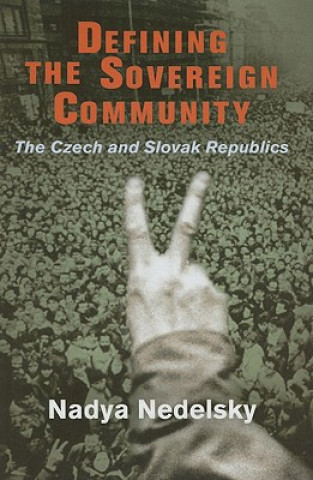
Kód: 04724184
Defining the Sovereign Community
Autor Nadya Nedelsky
Though they shared a state for most of the twentieth century, when the Czechs and Slovaks split in 1993 they founded their new states on different definitions of sovereignty. The Czech Constitution employs a civic model, founding ... celý popis
- Jazyk:
 Angličtina
Angličtina - Väzba: Pevná
- Počet strán: 352
Nakladateľ: University of Pennsylvania Press, 2009
- Viac informácií o knihe

118.24 €
Dostupnosť:
50 % šanca Máme informáciu, že by titul mohol byť dostupný. Na základe vašej objednávky sa ho pokúsime do 6 týždňov zabezpečiť.
Máme informáciu, že by titul mohol byť dostupný. Na základe vašej objednávky sa ho pokúsime do 6 týždňov zabezpečiť.Prehľadáme celý svet
Mohlo by sa vám tiež páčiť
-

Best Short Stories of O. Henry
23.54 € -5 % -

Mountain Between Us
23.54 €
Darčekový poukaz: Radosť zaručená
- Darujte poukaz v ľubovoľnej hodnote, a my sa postaráme o zvyšok.
- Poukaz sa vzťahuje na všetky produkty v našej ponuke.
- Elektronický poukaz si vytlačíte z e-mailu a môžete ho ihneď darovať.
- Platnosť poukazu je 12 mesiacov od dátumu vystavenia.
Informovať o naskladnení knihy
Zadajte do formulára e-mailovú adresu a akonáhle knihu naskladníme, zašleme vám o tom správu. Postrážime všetko za vás.
Viac informácií o knihe Defining the Sovereign Community
Nákupom získate 297 bodov
 Anotácia knihy
Anotácia knihy
Though they shared a state for most of the twentieth century, when the Czechs and Slovaks split in 1993 they founded their new states on different definitions of sovereignty. The Czech Constitution employs a civic model, founding the state in the name of "the citizens of the Czech Republic," while the Slovak Constitution uses the more exclusive ethnic model and speaks in the voice of "the Slovak Nation." Defining the Sovereign Community asks two central questions. First, why did the two states define sovereignty so differently? Second, what impact have these choices had on individual and minority rights and participation in the two states? Nadya Nedelsky examines how the Czechs and Slovaks understood nationhood over the course of a century and a half and finds that their views have been remarkably resilient over time. These enduring perspectives on nationhood shaped how the two states defined sovereignty after the Velvet Revolution, which in turn strongly affected the status of the Hungarian minority in Slovakia and the Roma minority in the Czech Republic. Neither state has secured civic equality, but the nature of the discrimination against minorities differs. Using the civic definition of sovereignty offers stronger support for civil and minority rights than an ethnic model does. Nedelsky's conclusions challenge much analysis of the region, which tends to explain ethnic politics by focusing on postcommunist factors, especially the role of opportunistic political leaders. Defining the Sovereign Community instead examines the undervalued historical roots of political culture and the role of current constitutional definitions of sovereignty. Looking ahead, Nedelsky offers crucial evidence that nationalism may remain strong in Slovakia and the Czech Republic, even in the face of democratization and EU integration, and is an important threat to both.
 Parametre knihy
Parametre knihy
Zaradenie knihy Knihy po anglicky Humanities History Regional & national history
118.24 €
- Celý názov: Defining the Sovereign Community
- Podnázov: The Czech and Slovak Republics
- Autor: Nadya Nedelsky
- Jazyk:
 Angličtina
Angličtina - Väzba: Pevná
- Počet strán: 352
- EAN: 9780812241655
- ISBN: 0812241657
- ID: 04724184
- Nakladateľ: University of Pennsylvania Press
- Hmotnosť: 672 g
- Rozmery: 238 × 163 × 28 mm
- Dátum vydania: 05. June 2009
Obľúbené z iného súdka
-

Hundred Years' War on Palestine
12.57 € -20 % -

Ethnic Cleansing of Palestine
13.37 € -19 % -

History of Japan
16.90 € -15 % -

Ten Myths About Israel
12.17 € -14 % -

Strange Death of Europe
15.29 € -20 % -

Decline and Fall of the Roman Empire
6.03 € -18 % -

Secret History
13.58 € -21 % -

God's Playground A History of Poland
67.62 € -

Mayflower
15.49 € -23 % -

How to be a Victorian
13.78 € -12 % -

Plantagenets
14.18 € -23 % -

General's Son
20.42 € -3 % -

Iran: A Very Short Introduction
9.95 € -23 % -

Temples of Karnak
151.05 € -

Cuneiform
10.96 € -23 % -

Twenty Years A-Growing
9.95 € -23 % -

China in Africa
37.33 € -

History of Witchcraft in England from 1558 to 1718
19.01 € -

Bohemian Paris
16.70 € -17 % -

Islandman
9.95 € -23 % -

Alexiad
17.50 € -20 % -

Lancaster And York
22.53 € -

Inside Hitler's Greece
20.62 € -19 % -

Modern France: A Very Short Introduction
11.97 € -15 % -

Diana: Her True Story - In Her Own Words
11.46 € -19 % -

The Fourth Turning
19.51 € -7 % -

The Oxford History of Ancient Egypt
15.29 € -23 % -

Churchill: The Power of Words
15.29 € -20 % -

Palestine
20.22 € -18 % -

Korean History in Maps
27.87 € -14 % -

Great Gatsby (Wisehouse Classics Edition)
16.09 € -36 % -

Viking Way
45.48 € -7 % -

The Thirteenth Tribe
12.57 € -

My Promised Land
18.41 € -

Vanished Kingdoms
19.11 € -20 % -

Age Of Revolution
16.29 € -23 % -

Life and Death of Anne Boleyn
23.24 € -3 % -

Coming of the Third Reich
18.41 € -23 % -

Children of Ash and Elm
17.20 € -20 % -

Europe Between the Oceans
34.11 € -5 % -

Socialism Betrayed
20.22 € -14 % -

303 Squadron
18.41 € -23 % -

Ancient Celts, Second Edition
27.66 € -15 % -

Dancing in the Glory of Monsters
15.79 € -21 % -

Battle of Britain: Luftwaffe Blitz (Images of War)
25.45 € -1 % -

Age of Confucian Rule
35.41 € -

Beyond Band of Brothers
16.29 € -23 % -

Benjamin Franklin
18.71 € -11 % -

On China
17.20 € -20 %
Osobný odber Bratislava a 2642 dalších
Copyright ©2008-24 najlacnejsie-knihy.sk Všetky práva vyhradenéSúkromieCookies


 21 miliónov titulov
21 miliónov titulov Vrátenie do mesiaca
Vrátenie do mesiaca 02/210 210 99 (8-15.30h)
02/210 210 99 (8-15.30h)